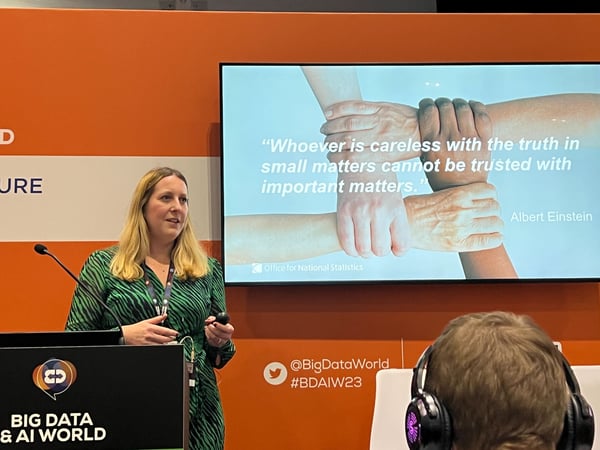Fostering a strong data culture: ‘What it comes down to is how you connect with people'
You can have the best data in the world; but if no one sees the value - it becomes meaningless. Fostering a strong data culture with people at the heart is key; opening the door to more informed policy-making, improved service delivery and innovation.
Three senior civil servants from the UK, Canada and the US share with Government Transformation Magazine how they are setting the stage for a more data-driven culture.
Overcoming pushback
Richard Patterson, Chief of Data and AI at the Defense Security Cooperation Agency in the US Federal Government, says there are a lot of buzzwords used to describe the culture around data “but what it comes down to is how you connect with people.”
connect with people.”
“Data doesn’t generate in the databases, data is generated by people, processes and pieces of paper,” he says. “A strong data culture is really about doing a better job of managing the data we have so we can pull it out and make decisions; this comes down to good quality data and ensuring people have the right tools and skills to use it appropriately.”
Patterson has found the people aspect to be one of the most important – and more challenging – areas of data, especially when there is resistance to the adoption of more data-driven methods. Disruption caused by new data processes is often inevitable, so having a strategy in place that helps employees to adapt and the organisation to scale its data use is key. “Organisational change is a really critical component to building a modern data culture, helping people to understand how and why certain processes are changing," Patterson explains.
The Defense Security Cooperation Agency’s recent introduction of Robotic Automation Processes has been met with both enthusiasm and hesitancy from employees, he says. “Some staff are worried it will make their job obsolete, while for others it represents a huge disruption in something they have been doing for the last 30 years.” Understanding the mindset behind the pushback is the first step in overcoming it, and creating a culture that engages with staff rather than pushes them out, he says. “We have spent a lot of time opening up communication and working out where the concerns are coming from.”
Engagement is key – otherwise it can be easy for organisations to jump to the wrong conclusions, he adds “I think a lot of organisations tend to look for the easy excuse; blaming it on the older population for instance, which is not what we’ve found at all.” Assumptions like this can lead to an even bigger divide between those that use data effectively and those that don't, he notes.
“What has been most impactful is teaching people to understand the real value of data-driven methods and how it impacts them directly - this has really driven forward our data journey.”
Back to basics
“For data to be seen as fundamental to every step of the policymaking process, you’ve got to get back to basics,” says Stephanie Howarth, the Welsh Government’s Chief Statistician. “This means getting data infrastructure right, which is so important for accessibility. You’ve got to make it easy for people to use and find data effectively.”
 Investments, such as ADR UK, are helping to create a ‘data first’ culture by supporting data infrastructure, providing resources to bring together data, and upskilling through their training capacity building programme, Howarth says.
Investments, such as ADR UK, are helping to create a ‘data first’ culture by supporting data infrastructure, providing resources to bring together data, and upskilling through their training capacity building programme, Howarth says.
Simplifying the approach to data is another important step, Howarth says; opening the door for innovation by enabling teams to use existing data “in new and exciting ways". As an example, Howarth points to the Welsh Government’s Data Visualisation Service; an interactive platform containing data standards and templates that allows employees to view, present and interpret data more easily.
There are other quick wins; straightforward yet fundamental steps organisations can take to improve their data culture. Sharing successes and case studies for data is “an easy but often overlooked” one, Howarth says. “It is quite often the simplest things that have the biggest impact. I'm always a big believer in sharing specific case studies because people always want to see how it's been done before.”
She emphasises the need to celebrate data success stories within the organisations but also more widely, across government. “It makes the journey a bit more real and relatable. It makes a real difference to people when you can see how data has directly impacted policy formation for example - plus it's really easy to do.”
Developing the right skills and tools to effectively use data is another essential building block, Howarth says. She points to the recently launched One Big Thing initiative as an important stepping stone; a cross-government programme led by the Cabinet Office which offers all civil servants a day of data training across three different competency levels.
“It’s a really good way of emphasising that data is something for everyone. We've all got a role in understanding how our data is relevant to our work, and an opportunity to upskill as a result of that. Capability building is really important; then re emphasising the message that data is something that's important for all of us in all of our roles.”
Literacy and leadership
Celio Oliveira is a Lead Data Scientist for the Government of Canada. He explains how developing a meaningful data culture requires a high level of data literacy: “People must feel empowered enough to ask the right questions and be confident to use data to derive the correct insights.” However, organisations must first understand the needs of their own teams in order to deliver the right kind of training - and plug the necessary gaps in knowledge and expertise, he adds.
Against this backdrop, Oliveira and his team have been trying to create an analysis gap to see what needs to be tackled and what problem in the data lifecycle is most important. In parallel, Oliveira says they will compile results of a data literacy survey to generate data personas to ensure they are growing the right capabilities in the right places.
He points out a particular need for senior leaders to understand the strategic value of data and distinct data literacy competencies. “There are many folds and pockets in the data science ecosystem, which senior management tend to overlook,” he explains. “The right professional must be hired with the right skill sets. There is a misconception that you can hire data scientists to create dashboards but those are data analysts. Similarly, if you have problems with your machine learning algorithms, you need to hire a machine learning engineer.”
A failure to recognise this can lead to talent retention problems in data teams, Oliveira adds. “I’ve seen this mistake before in government; a lot of professionals are being hired to do something that they are not supposed to be doing - and they end up leaving.”
Leaders must understand the role they play in building or preventing a data-driven culture. The creation of working groups and steering committees can provide them with both clarity and trust around data, Oliveira notes.
Howarth agrees that the role that leadership plays in building a strong data culture cannot be overlooked. However, “there's no point in it just being a top down approach,” she says. “It needs to come from both directions, where you have a strong leadership message about the importance of data, but where people at working level are equally engaged and have the right skills to use data effectively.”






